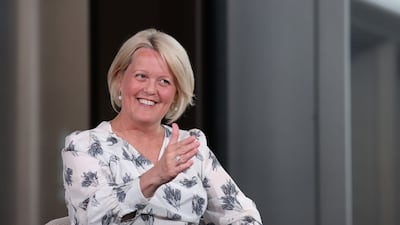The chief executive of the NatWest banking group, Dame Alison Rose, has apologised to Nigel Farage for "deeply inappropriate comments" made about him in official bank papers.
She had been under growing political pressure since Mr Farage, a British broadcaster and former politician, criticised how his account was closed.
Mr Farage, the former UK Independence Party leader and a figurehead of Brexit, said he had acquired a report from the bank’s reputational risk committee used to justify the account closures because of his personal and political views.
His accounts had been with Coutts, a NatWest subsidiary and the group's private banking arm. It caters to wealthy clients and has been referred to as “the king's bank” for that reason.
Coutts said it was not its policy to close customer accounts solely on the basis of legally held political and personal views and reiterated that account closures involved a number of factors “including commercial viability, reputational considerations, and legal and regulatory requirements”.
David Frost, the former minister of state at the Cabinet Office, wrote in the Daily Telegraph that “executives who close banking facilities for political reasons should not be considered ‘fit and proper’ people to run banks”.
David Jones, a former minister, said: “The buck stops with the person at the top. I certainly think she [Dame Alison] should go, she’s presided over this. This is a disgrace to banking.”
On Thursday evening, the Treasury announced that UK banks would be subjected to stricter rules over how customer accounts are closed. Dame Alison apologised.
"No individual should have to read such comments and I apologise to Mr Farage for this," Dame Alison said. "I have written to him today to make that apology and reiterate our offer of alternative banking arrangements.
"In addition, I am commissioning a full review of the Coutts' processes for how these decisions are made and communicated to ensure we provide a better, more transparent experience for all our customers in the future."
It has also emerged that Dame Alison sat next to Simon Jack, the BBC’s business editor, at a charity dinner the night before he wrote a story claiming Mr Farage had lost his accounts for “commercial reasons”, citing unnamed sources at NatWest.
Mr Farage has demanded an apology from the BBC for Mr Jack's reporting at that time.
The former head of the British Bankers' Association, Angela Knight, said the issue of politically exposed persons was a grey area and took issue with the bank's failure to be candid with Mr Farage.
“I do find it somewhat uncomfortable to see a situation arise where because of somebody's legitimate views, even though you may not agree with them, somehow has resulted in the service being withdrawn and then not being told about it,” she said.
To have an account at Coutts requires £1 million ($1.29 million) in investments or borrowing, including a mortgage, or £3 million in savings.
MailOnline published what it said were the full documents cited by Mr Farage on Wednesday.
They showed that Coutts had opted to cut ties with him after a mortgage he had taken out had expired, and the bank therefore was ending the relationship “on commercial grounds”.

Ministers, who have been critical of the actions by Coutts and NatWest, have said they are drawing up plans for new laws that could lead to banks losing their licences if they blacklist people simply for holding controversial views.
'Thinly veiled political discrimination'
Prime Minister Rishi Sunak said “it wouldn't be right” for banks to deny services to those exercising the right to lawful free speech. Foreign Secretary James Cleverly said the decision to close Mr Farage's account “completely undermines the trust we have in our banking and financial systems”.
Former Brexit secretary David Davis said it amounted to “thinly veiled political discrimination” and called it a “vindictive, irresponsible and undemocratic action”.
Treasury minister Andrew Griffith said on Twitter that while businesses had a right to protect against reputational risks, banks had a “duty not to 'debank' because you disagree with someone's views”.
Former business secretary Jacob Rees-Mogg called for an inquiry.
'Swift intervention'
Mr Farage welcomed the criticism and praised the reactions as “one of the swiftest interventions I've seen by government for many, many years”.
“I think that's because this problem of the way banks have been behaving has been building up for years and years and years,” he said.

“Every MP will know of constituents, small businessmen and women who've literally been shut down by their banks with no reason given whatsoever.
“I also think that because of the politically exposed persons rule, I think they're beginning to realise that this system is coming for them as well.”


